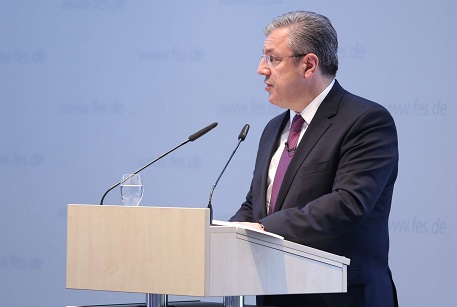Carnegie Europe: Georgia’s NATO, EU and Russia challenge

Carnegie Europe, an internationally influential foreign policy think-tank, has published its interview with Georgia’s Prime Minister Giorgi Kvirikashvili.
Speaking with Judy Dempsey, editor-in-chief of the Strategic Europe blog at Carnegie Europe, during his recent official visit in Berlin, Germany, Kvirikashvili discussed Georgia’s foreign and domestic policies. He talked about Georgia’s Euro-Atlantic aspirations, Georgia-Russia relations and his country’s visa liberalisation prospects with the European Union (EU).
Throughout the course of the talk, Kvirikashvili was adamant about Georgia’s path towards Euro-Atlantic integration.
We don’t see any alternative for ensuring long-term stability for Georgia to joining this Euro-Atlantic family of countries,” Kvirikashvili said boldly.
It’s not only the military dimension that attracts us to this family. There are also common values of democracy and freedom, which incentivize us to continue very important reforms that will transform the country into a European country. Nothing can derail us from this track,” he stressed.
When discussing Georgia’s relations with the North Atlantic Treaty Organisation (NATO), Kvirikashvili stressed Georgia hoped the NATO Summit in Warsaw, Poland on July 8-9 would result in Georgia being offered a "broader cooperation package with NATO”.
Despite the Alliance not granting Georgia a Membership Action Plan (MAP), which would put the country on the irreversible path of joining the military alliance, Kvirikashvili was sanguine about NATO’s stance towards Georgia and he welcomed the recent joining of Montenegro to the Alliance.
I think the fact that Montenegro is joining NATO is a very good thing,” Kvirikashvili explained.
"It shows that the open-door policy is in place. I think the only thing we have to do is to stay very consistent on this road, to continue cooperation with NATO. We hope that the Warsaw summit will result in a broader cooperation package with NATO that will allow us to strengthen Georgia’s defense capabilities. And I think that someday in the future, the window of opportunity will be open for Georgia.”
The Georgian high official was also confident of Georgia’s visa liberalisation prospects. Kvirikashvili told Dempsey introducing a visa waiver for Georgia to the EU was just a "matter of time.”
We may have to wait a couple more months to put in place the snap-back mechanisms and then, hopefully, in September the final decision will be made by the European Parliament,” Kvirikashvili stated.
In the meantime, Kvirikashvili said Georgia’s Euro-Atlantic course didn’t exclude having a relationship with Russia – the country that invaded Georgia in 2008 and left hundreds of thousands of Georgian citizens displaced.
He said the Georgian Government strived for constructive relations with Russia but never at the expense of changing Georgia’s western course.
We do not see any alternative to talking with [Russia],” Kvirikashvili argued. "We have informal formats of negotiations. But these cannot compromise our strategic values of territorial integrity and sovereignty. We understand all the difficulties of the situation that we are in right now. And this started after the restoration of Georgia’s independence [in 1991].
Of course, the main reason was for Georgia to be sovereign, to move toward democratic standards, toward the EU, toward NATO. But a row of mistakes was made by everybody. The fact that we are now facing occupation challenges, that we face a series of violations of human rights in the occupied territories, tells us that we need to find any potential way of restoring relations with Russia. Again, this can only happen with the respect of Georgia’s sovereign decisions [including] which club we want to belong to, on the basis of territorial integrity.”
Kvirikashvili spoke of the importance of finding a peaceful solution to the ongoing conflict and said it was important to express and communicate messages to Russian politicians that Georgia does not want to membership of NATO or reforms that would make Georgia an enemy of Russia.
We want to restore relations. We want to restore normal relations. And again, for this, we would need to follow our own path,” said Georgia’s Prime Minister.
Carnegie Europe, regarded as the third most influential think-tank in the world, is a European foreign policy research institute that offers in depth analysis and policy recommendations on strategic issues facing the EU and its member states.
It founded in 2007 and has become the go-to source for European foreign policy analysis in Brussels, Belgium on topics ranging from Turkey to the Middle East and the Eastern neighborhood to security and defence.
See the full interview here.
 Tweet
Tweet  Share
Share